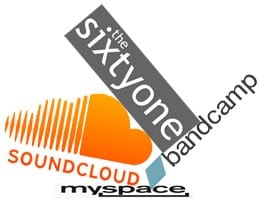Rumors are circulating that the social networking site MySpace may be shut down because of financial losses. Although most people (and businesses) have moved their profiles over to Facebook, MySpace remains the primary source for bands to showcase their talents allowing fans to listen to music for free. So where are bands to go if MySpace is shut down? Where can fans discover, listen to, and purchase new music? Some bands have already made the switch from MySpace to slick new websites like thesixtyone, Bandcamp, and SoundCloud.

Thesixtyone
Thesixtyone was created in 2008 and named after U.S. Highway 61, which was traveled by pioneering musicians like Elvis, Bob Dylan, and Muddy Waters. Thesixtyone requires no sign-up fee, and it’s a good way for new artists to get started, as it allows musicians to sell music and merchandise directly to fans through band profiles on the website. Thesixtyone guarantees artists at least $7 per album, and pays them every 30 days—unlike a record deal where bands might only get $1-2 per album sold.
Thesixtyone also allows users to see when their favorite bands will be on tour, to listen to sample tracks, to “heart” songs (similar to “liking” something on Facebook), to share songs on Facebook and Twitter, and to download music. One of the reasons thesixtyone is a great alternative for new artists is that it uses collaborative filtering and is structured in way that allows users to explore lesser-known artists similar to ones they are already interested in, giving undiscovered bands a chance to be heard. Check out the profile of Angus & Julia Stone for an idea of what a profile on thesixtyone looks like and to listen to a fantastic Aussie band.
BandCamp
Similar to thesixtyone, but perhaps better known for more established bands, Bandcamp also allows musicians to sell their songs and merchandise directly to fans. According to the site, albums for sale on Bandcamp outsell tracks 4 to 1, whereas “in the rest of the music buying world, tracks outsell albums 16 to 1.” Bandcamp makes its money through a 15% revenue share on sales (or 10%, as soon as the band makes $5,000 in sales). Some of Bandcamp’s many free account features include allowing bands to set their own prices for music, supporting many music file formats, being search engine optimized, and, like thesixtyone, allowing for custom domain names. One of the best artist features of Bandcamp is its rich system of real-time statistics about what and when artists’ songs are being listened to and downloaded, what search terms are generating traffic, and where music is embedded.
It’s up to the artists to decide if fans can sample entire songs/albums before downloading, but from Bandcamp, optimally, users are able to listen to and buy music and full albums, as well as view tour dates. One famous Bandcamp user is Sufjan Stevens, who allows anyone to listen to his entire 2010 album “The Age of Adz” before downloading. Some bands even let you download their entire album for free, such as Austin-based indie/folk band Little Lo. (You can also check out Little Lo at Cactus Cafe--a ThunderTix venue--with The Sour Notes on January 20, 2011.)
SoundCloud
Unlike thesixtyone or Bandcamp, SoundCloud focuses more on musicians and bands, rather than fans. SoundCloud allows artists to record or upload music, share it on various social networking websites, and get feedback in the form of comments and statistics. But like thesixtyone and Bandcamp, users can also view band profiles and listen to songs for free. Austin-based and Girl-Talk-like band, Beat Logic, posts their music on SoundCloud.
Although future events will probably spell the demise of an old and tired MySpace, it’s not the end of the world for bands and their fans. Great new websites are ready to take up the mantle and provide us even better experiences on music sharing.
Note: ThunderTix users, take advantage of these sites by adding links to the artist profiles for your events via form fields in your event creation and edit pages. Allowing your users to hear and share music helps raise awareness, social sharing, and ticket sales.
Its the
Oh what to tweet about on Twitter!
Event Wristbands: Cooler than a concert t-shirt?